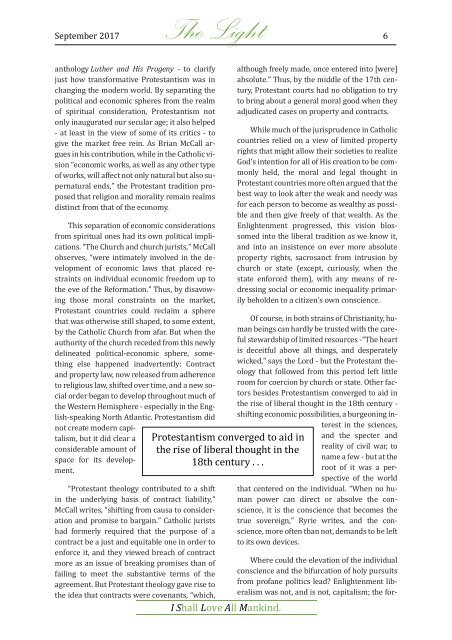2017 09 The Light September 2017
Organ of the worldwide Lahore Ahmadiyya Movement. We believe that the Holy Prophet (s) was the last prophet after whom no prophet, old or new shall come and that all those who recite the kalima are Muslims. We believe that Is a liberal, tolerant, inclusive, peaceful, rational and scientific religion.
Organ of the worldwide Lahore Ahmadiyya Movement. We believe that the Holy Prophet (s) was the last prophet after whom no prophet, old or new shall come and that all those who recite the kalima are Muslims. We believe that Is a liberal, tolerant, inclusive, peaceful, rational and scientific religion.
Create successful ePaper yourself
Turn your PDF publications into a flip-book with our unique Google optimized e-Paper software.
<strong>September</strong> <strong>2017</strong> <strong>The</strong><br />
<strong>Light</strong> 6<br />
anthology Luther and His Progeny - to clarify<br />
just how transformative Protestantism was in<br />
changing the modern world. By separating the<br />
political and economic spheres from the realm<br />
of spiritual consideration, Protestantism not<br />
only inaugurated our secular age; it also helped<br />
- at least in the view of some of its critics - to<br />
give the market free rein. As Brian McCall argues<br />
in his contribution, while in the Catholic vision<br />
“economic works, as well as any other type<br />
of works, will affect not only natural but also supernatural<br />
ends,” the Protestant tradition proposed<br />
that religion and morality remain realms<br />
distinct from that of the economy.<br />
This separation of economic considerations<br />
from spiritual ones had its own political implications.<br />
“<strong>The</strong> Church and church jurists,” McCall<br />
observes, “were intimately involved in the development<br />
of economic laws that placed restraints<br />
on individual economic freedom up to<br />
the eve of the Reformation.” Thus, by disavowing<br />
those moral constraints on the market,<br />
Protestant countries could reclaim a sphere<br />
that was otherwise still shaped, to some extent,<br />
by the Catholic Church from afar. But when the<br />
authority of the church receded from this newly<br />
delineated political-economic sphere, something<br />
else happened inadvertently: Contract<br />
and property law, now released from adherence<br />
to religious law, shifted over time, and a new social<br />
order began to develop throughout much of<br />
the Western Hemisphere - especially in the English-speaking<br />
North Atlantic. Protestantism did<br />
not create modern capitalism,<br />
but it did clear a<br />
considerable amount of<br />
space for its development.<br />
“Protestant theology contributed to a shift<br />
in the underlying basis of contract liability,”<br />
McCall writes, “shifting from causa to consideration<br />
and promise to bargain.” Catholic jurists<br />
had formerly required that the purpose of a<br />
contract be a just and equitable one in order to<br />
enforce it, and they viewed breach of contract<br />
more as an issue of breaking promises than of<br />
failing to meet the substantive terms of the<br />
agreement. But Protestant theology gave rise to<br />
the idea that contracts were covenants, “which,<br />
Protestantism converged to aid in<br />
the rise of liberal thought in the<br />
18th century . . .<br />
I Shall Love All Mankind.<br />
although freely made, once entered into [were]<br />
absolute.” Thus, by the middle of the 17th century,<br />
Protestant courts had no obligation to try<br />
to bring about a general moral good when they<br />
adjudicated cases on property and contracts.<br />
While much of the jurisprudence in Catholic<br />
countries relied on a view of limited property<br />
rights that might allow their societies to realize<br />
God’s intention for all of His creation to be commonly<br />
held, the moral and legal thought in<br />
Protestant countries more often argued that the<br />
best way to look after the weak and needy was<br />
for each person to become as wealthy as possible<br />
and then give freely of that wealth. As the<br />
Enlightenment progressed, this vision blossomed<br />
into the liberal tradition as we know it,<br />
and into an insistence on ever more absolute<br />
property rights, sacrosanct from intrusion by<br />
church or state (except, curiously, when the<br />
state enforced them), with any means of redressing<br />
social or economic inequality primarily<br />
beholden to a citizen’s own conscience.<br />
Of course, in both strains of Christianity, human<br />
beings can hardly be trusted with the careful<br />
stewardship of limited resources -“<strong>The</strong> heart<br />
is deceitful above all things, and desperately<br />
wicked,” says the Lord - but the Protestant theology<br />
that followed from this period left little<br />
room for coercion by church or state. Other factors<br />
besides Protestantism converged to aid in<br />
the rise of liberal thought in the 18th century -<br />
shifting economic possibilities, a burgeoning interest<br />
in the sciences,<br />
and the specter and<br />
reality of civil war, to<br />
name a few - but at the<br />
root of it was a perspective<br />
of the world<br />
that centered on the individual. “When no human<br />
power can direct or absolve the conscience,<br />
it is the conscience that becomes the<br />
true sovereign,” Ryrie writes, and the conscience,<br />
more often than not, demands to be left<br />
to its own devices.<br />
Where could the elevation of the individual<br />
conscience and the bifurcation of holy pursuits<br />
from profane politics lead? Enlightenment liberalism<br />
was not, and is not, capitalism; the for-














